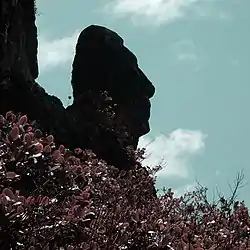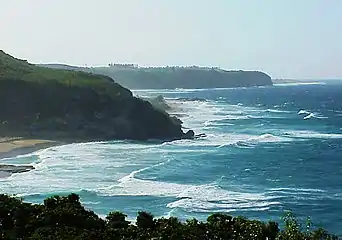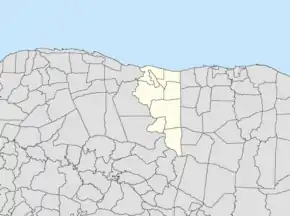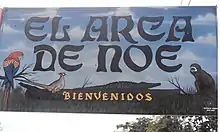Quebradillas, Puerto Rico
Quebradillas (Spanish pronunciation: [keβɾaˈðiʎas]) is a municipality of the island of Puerto Rico located in the north-western shore bordering the Atlantic Ocean, north of San Sebastián; east of Isabela; and west of Camuy. Quebradillas is spread over seven barrios and Quebradillas Pueblo (the downtown area and the administrative center of the city). It is part of the San Juan-Caguas-Guaynabo Metropolitan Statistical Area.
Quebradillas
Municipio de Quebradillas | |
|---|---|
City and Municipality | |
 El Indio de Puerto Herminia in Quebradillas | |
 Flag | |
| Nicknames: "La Guarida del Pirata", "La Ciudad del Cooperativismo" | |
| Anthem: "De lejos canto, porque anhela el corazón" | |
 Map of Puerto Rico highlighting Quebradillas Municipality | |
| Coordinates: 18°28′26″N 66°56′19″W | |
| Commonwealth | |
| Founded | June 7, 1823 |
| Barrios | |
| Government | |
| • Mayor | Heriberto Velez Velez (PPD) |
| • Senatorial dist. | 3 - Arecibo |
| • Representative dist. | 15 |
| Area | |
| • Total | 27.7 sq mi (71.66 km2) |
| • Land | 23.2 sq mi (60 km2) |
| • Water | 4.5 sq mi (11.66 km2) |
| Population (2010) | |
| • Total | 25,919 |
| • Density | 940/sq mi (360/km2) |
| Demonym(s) | Quebradillanos |
| Time zone | UTC−4 (AST) |
| ZIP Code | 00678 |
| Area code(s) | 787/939 |
| Major routes | |
| Website | www |
Quebradillas is called "La Guardia del Pirata" (The Pirate's Hideout). A well-known beach in the area, Puerto Hermina, is home to an old structure known to have been a hiding place for pirates and their contraband.
History
The town was founded in 1823 by Felipe Ruiz. There were many factors that cause the inhabitants of the territory of Puerto Rico to be independent from the towns that formed the Hato de la Tuna and that's why they formed a municipality. They didn't have chapels or churches, religious services and priests, a place to bury the dead, a post office, and good roads to transport the agricultural products produced in their land. they relied on the other municipalities of Camuy, Hatillo and Isabela. This led the residents of the area to organize a corporation that would look after the political, economic and administrative interests of "Las Quebradillas" and its jurisdiction This town derives its name from the large number of streams flowing through it. Quebradillas means "small streams".
Geography

Quebradillas is home to one of the 20 designated forest preserves in Puerto Rico, the Guajataca Forest. The forest serves as a great example of an unusual topography known as karst country. Karst is characterized by dissolved limestone formations such as sinkholes and haystack-shaped hills known as "mogotes". It is also home to the beautiful man-made reservoir, Guajataca Lake (2.5 mi or 4.0 km long), where you can fish for largemouth bass, peacock bass, tilapia and bluegill (in Spanish known as "chopa"). You can also go hiking or camping. The Puerto Rico Council of the Boy Scouts of America maintains a campground on the lake known as Camp Guajataka. The name Guajataca comes from the name of a Taíno Indian chief who lived in this area. This Indian chief also gives his name to Guajataca Beach to the north where Río Guajataca flowing from Guajataca Lake meets the Atlantic Ocean. Guajataca Beach is popular with surfers and is known for its white sands and wild waters. This beach is ideal for sunning and collecting seashells.[1]
Barrios

Like all municipalities of Puerto Rico, Quebradillas is subdivided into barrios. The municipal buildings, central square and large Catholic church are located in a barrio referred to as "el pueblo".[2][3][4]
Sectors
Barrios (which are like minor civil divisions)[5] in turn are further subdivided into smaller local populated place areas/units called sectores (sectors in English). The types of sectores may vary, from normally sector to urbanización to reparto to barriada to residencial, among others.[6][7][8]
Special Communities
Comunidades Especiales de Puerto Rico (Special Communities of Puerto Rico) are marginalized communities whose citizens are experiencing a certain amount of social exclusion. A map shows these communities occur in nearly every municipality of the commonwealth. Of the 742 places that were on the list in 2014, the following barrios, communities, sectors, or neighborhoods were in Quebradillas: Guajataca, Montadero, Parcelas Italas in Terranova, San Antonio, and Sector Las Piedras Barrio Cocos.[9]
Climate
The general climate of the town is subtropical.
| Climate data for Quebradillas, Puerto Rico | |||||||||||||
|---|---|---|---|---|---|---|---|---|---|---|---|---|---|
| Month | Jan | Feb | Mar | Apr | May | Jun | Jul | Aug | Sep | Oct | Nov | Dec | Year |
| Average high °F (°C) | 82.5 (28.1) |
82.8 (28.2) |
83.6 (28.7) |
84.6 (29.2) |
85.8 (29.9) |
86.8 (30.4) |
87.1 (30.6) |
87.4 (30.8) |
87.7 (30.9) |
87.5 (30.8) |
85.8 (29.9) |
84.1 (28.9) |
85.5 (29.7) |
| Average low °F (°C) | 66.3 (19.1) |
65.4 (18.6) |
66.1 (18.9) |
67.6 (19.8) |
68.7 (20.4) |
69.9 (21.1) |
71.3 (21.8) |
71.4 (21.9) |
71.3 (21.8) |
70.1 (21.2) |
68.7 (20.4) |
67.6 (19.8) |
68.7 (20.4) |
| Average precipitation inches (mm) | 4.2 (110) |
3.0 (76) |
3.4 (86) |
4.5 (110) |
6.2 (160) |
4.8 (120) |
3.3 (84) |
4.7 (120) |
4.7 (120) |
5.0 (130) |
5.9 (150) |
5.0 (130) |
54.5 (1,380) |
| Source: Weatherbase [10] | |||||||||||||
Demographics
Puerto Rico was ceded by Spain in the aftermath of the Spanish–American War under the terms of the Treaty of Paris of 1898 and became a territory of the United States. In 1899, the United States conducted its first census of Puerto Rico finding that the population of Quebradillas was 7,432.
| Historical population | |||
|---|---|---|---|
| Census | Pop. | %± | |
| 1900 | 7,432 | — | |
| 1910 | 8,152 | 9.7% | |
| 1920 | 9,404 | 15.4% | |
| 1930 | 10,190 | 8.4% | |
| 1940 | 11,494 | 12.8% | |
| 1950 | 13,712 | 19.3% | |
| 1960 | 13,075 | −4.6% | |
| 1970 | 15,582 | 19.2% | |
| 1980 | 19,728 | 26.6% | |
| 1990 | 21,425 | 8.6% | |
| 2000 | 25,450 | 18.8% | |
| 2010 | 25,919 | 1.8% | |
| U.S. Decennial Census[11] 1899 (shown as 1900)[12] 1910-1930[13] 1930-1950[14] 1960-2000[15] 2010[3] | |||
Tourism
Landmarks and places of interest

There are 6 beaches in Quebradillas.[16]
The town of Quebradillas had a private zoo called El Arca de Noé (Noah's Ark), which was in operation for about 50 years. In 2012 when its owner was 90 years old and could no longer care for the animals, they were moved to Mayagüez.[17][18]
The main attractions of Quebradillas are:
- El Merendero (Scenic Park and Ocean Look-Out)
- Guajataca Lake Reservoir (Inland)
- La Cabeza del Indio (Indian Head at Puerto Hermina Beach)
- The Liberty Theater (Downtown) [19]
- El Museo de Muñecas (Doll Museum)[houses over 1,000 Barbie dolls] - in Barrios Cocos
- Puerto Hermina Beach Pirate Ruins[20]
- El Puente Blanco (Old White Train Bridge)
- Casa Rafols-Iribas, site of Casa de la Cultura Cacique Mabodamaca (non-profit organization dedicated to preserve the culture, the arts and the historical sites of the town of Quebradillas)
- Los Chorritos Pirata (aquatic park)
- Mini golf course
- Miradero Guajataca
Economy
Business
A small shopping center called Quebradillas Plaza is located in this municipality along with some manufacturing industries.
An event which negatively affected the region in the decade of the 1990s was the disappearance of tax exemptions to the private corporations [section 936 of the code of the US Internal Revenue Service ], which at the time was the ideal excuse for the closing of one of the greater manufacturers of textiles in the northwest area of the island. This decline of the industry of the needle occurred similarly in the bordering cities like Isabela and Camuy, generating a regional economic decline as the locals greatly depended on these jobs. In nearby towns like Hatillo, Mayagüez and Aguadilla, the arrival of mega stores and new shopping centers attracted the jobs that used to be in Quebradillas, helping to create the general vision of the town as "ghostly" because there is little movement in the city.
At the same time, since the Island lacks mass public transportation, people must resort to private cars (known as carro publico, public car in English) used as a bus as a mode of transportation. This, coupled with the fact that the only road to access the important cities, the Puerto Rico Highway 2, is congested most of the day, makes it difficult for people in the area to find work and thus contributes to the general economic decline.
Ironically, the town possesses one tunnel that at the beginning of the 20th century was utilized by steam driven trains that traveled throughout the Island. The disappearance of the same is considered as one of the most ironic facts of the modern history of Puerto Rico, since these railways were very extensive, built through earthly bluffs and were of great utility. Today, their absence only aggravates the problem of mass transit and the dependence on privately owned vehicles as the only method of transportation.[21]
The economy, entering into the 21st century, is based on retail sales. Many small businesses are located along the two main thoroughfares that cross Quebradillas. These consist mainly of light hardware, bakeries, pharmacies, seafood restaurants, American fast food chains and automobile car repair shops.
The town has bank branches for Banco Popular and local savings and credit Unions. These credit unions are most noted for their involvement in common and cultural activities, sponsoring and participating in festivals of typical music [Festival of the Gourd in December], sports and educational activities.
Culture
Festivals and events
Quebradillas celebrates its patron saint festival in October. The Fiestas Patronales de San Rafael Arcangel is a religious and cultural celebration that generally features parades, games, artisans, amusement rides, regional food, and live entertainment.[1][22]
Other festivals and events celebrated in Quebradillas include:
- Wake of the Three Kings – January
- Kite festival – February
- Guajataca Carnival – January/February
- Serenade to mothers – May
- Serenade to fathers – June
- Cultural Festival – December
Sports
The town's official basketball team is Los Piratas'[23] who have won a dramatic number of tournaments in the past. Presently the team has made a "comeback" and has won the championship of the island (2013).
- Basketball teams
- Surfing - Guajataca Beach and Puerto Hermina (Pirates Cove)
- Skateboarding - San Jose Skatepark
- Baseball - Los Cocos Park
- Longboarding
Government
The town's government is a small unit with few powers it can execute. Small elections are hosted in specific schools every four years to choose a town mayor.
| # | Mayor | Term start | Term end | Terms | ||
|---|---|---|---|---|---|---|
| 01 | Felipe Ruiz | 1823 | 1 | None | ||
| 02 | José de Ribera | 1824 | 1 | None | ||
| 03 | Francisco Antonio Bravo | 1824 | 1 | None | ||
| 04 | Francisco Rodríguez | 1825 | 1 | None | ||
| 05 | Juan Antonio Cancela | 1828 | 1 | None | ||
| 06 | Pedro Correa | 1828 | 1 | None | ||
| 07 | Antonio Comulada (1st term) | 1828 | 1 | None | ||
| 08 | Clemente Correa | 1829 | 1832 | 1 | None | |
| 09 | Antonio J. Porrata | 1833 | 1 | None | ||
| 10 | Antonio Comulada (2nd term) | 1839 | 1 | None | ||
| 11 | José Bernabé Carranza | 1847 | 1 | None | ||
| 12 | José Cesáreo Zeno | 1849 | 1 | None | ||
| 13 | Juan de la Cruz Coca | 1850 | 1 | None | ||
| 15 | Máximo Ribas | 1852 | 1 | None | ||
| 16 | José Ramón Mestre | 1853 | 1 | None | ||
| 17 | Lucas Leonides Villalón | 1854 | 1 | None | ||
| 18 | Luis Vega de Alicea | 1855 | 1856 | 1 | None | |
| 19 | Carlos Garavarain | 1859 | 1860 | 1 | None | |
| 20 | Eduardo Delgado | 1867 | 1 | None | ||
| 21 | Carlos González Jiménez | 1868 | 1 | None | ||
| 22 | José Perignat y Ochoa | 1868 | 1 | None | ||
| 23 | José de Pinguas | 1869 | 1 | None | ||
| 24 | José Bernabé Carrazoza | 1870 | 1871 | 1 | None | |
| 25 | Manuel Lloveras | 1871 | 1 | None | ||
| 27 | Francisco G. Condomo | 1871 | 1872 | 1 | None | |
| 28 | Fernando Ruiz | 1872 | 1 | None | ||
| 29 | Nicolás Iglesias | 1872 | 1873 | 1 | None | |
| 30 | Joaquín Aldea | 1873 | 1 | None | ||
| 33 | Manuel Lamela y Valdés (1st term) | 1874 | 1879 | 1 | None | |
| 34 | Máximo Laborde | 1879 | 1882 | 1 | None | |
| 35 | Manuel Lamela y Valdés (2nd term) | 1882 | 1884 | 1 | None | |
| 36 | Felipe Negrón | 1884 | 1890 | 1 | None | |
| 37 | Nicasio Rodicio (1st term) | 1890 | 1 | None | ||
| 37 | José Fidel Hernández (2nd term) | 1891 | 1 | None | ||
| 38 | Buenaventura Ocasio | 1892 | 1 | None | ||
| 39 | Eusebio de la Torre | 1892 | 1893 | 1 | None | |
| 40 | José Fidel Hernández (2nd term) | 1894 | 1 | None | ||
| 41 | Nicasio Rodicio (2nd term) | 1894 | 1895 | 1 | None | |
| 42 | José Garriga | 1896 | 1 | None | ||
| 43 | Nicasio Rodicio (3rd term) | 1896 | 1898 | 1 | None | |
| 44 | Honorio Hernández | 1898 | 1 | None | ||
| 45 | Francisco Ramón Saavedra | 1898 | 1 | None | ||
| 47 | Conrado Santiago | 1900 | 1 | None | ||
| 48 | Manuel R. Ríos | 1901 | 1 | None | ||
| 49 | Manuel Reyes Ruiz | 1902 | 1 | None | ||
| 50 | Santiago Mestre | 1904 | 1 | None | ||
| 51 | Honorio Hernández (1st term) | 1908 | 1 | None | ||
| 52 | Honorio Hernández (2nd term) | 1912 | 1917 | 1 | None | |
| 53 | Arcides Ocasio | 1917 | 1 | None | ||
| 54 | Manuel Lamela Abreu | 1918 | 1944 | 1 | None | |
| 55 | José Pérez Soler | 1945 | 1948 | 1 | None | |
| 56 | Gerardo Pérez Soler | 1948 | 1960 | 3 | None | |
| 57 | Federico Molinari de Jesús | 1960 | 1964 | 1 | None | |
| 58 | Gerardo Pérez Soler | 1964 | 1970 | 1 | None | |
| 60 | Rafael Pérez Santalíz | 1970 | 1992 | 3 | PPD | |
| 59 | Juan "Johnny" I. Rivera Vargas | 1992 | 1996 | 1 | PPD | |
| 60 | Luis "El Cano" A. Pérez Reillo | 1996 | 2005 | 2 | PNP | |
| 61 | Heriberto Vélez Vélez | 2005 | Incubment | 3 | PPD | |
Transportation
There are 4 bridges in Quebradillas.[24]
Symbols
Flag
It has two red quarters. The red stands for struggle, effort and sacrifice. The other two quarters have each five green and white stripes, similar to those that appear in the shield.[25]
Coat of arms
The three waved stripes represent the quebradillas, over the green background of the vegetation. The fish and the walking stick (distinctive of the traveler), are insignias of San Rafael Arcángel, by allusion from the episodes narrated in the book of Tobías in the Old Testament.[25]
Education
The town features many public and private schools. There is also a public electronic library near Los Chorritos Pirata water park.
New schools have been created thanks to a government initiative to have "21st century" schools.
Public Schools
- Manuel Ramos Hernandez
- Juan Alejo de Arizmendi
- Eugenio Maria De Hostos
- Luis Muñoz Rivera
- Honorio Hernandez
- Pedro Albizu Campos
- Ramon E. Betancez
- Ramon Avila Molinari
- Ramon Saavedra
- Jose De Diego
Private Schools
- Colegio San Rafael
- Soles del Jardín
- Pequeños Aprendiendo
Gallery
.jpg.webp) Puerto Hermina beach
Puerto Hermina beach
See also
- Quebradillas Limestone—limestone rock formation in area.
- San Juan–Caguas–Guaynabo metropolitan area topics
- Did you know—Puerto Rico?
References
- "Quebradillas Municipality". enciclopediapr.org. Fundación Puertorriqueña de las Humanidades (FPH). Archived from the original on 2019-06-18. Retrieved 2019-03-20.
- Gwillim Law (20 May 2015). Administrative Subdivisions of Countries: A Comprehensive World Reference, 1900 through 1998. McFarland. p. 300. ISBN 978-1-4766-0447-3. Retrieved 25 December 2018.
- Puerto Rico:2010:population and housing unit counts.pdf (PDF). U.S. Dept. of Commerce Economics and Statistics Administration U.S. Census Bureau. 2010. Archived (PDF) from the original on 2017-02-20. Retrieved 2018-12-26.
- "Map of Quebradillas" (PDF). Archived (PDF) from the original on 2011-06-08. Retrieved 2007-12-18.
- "US Census Barrio-Pueblo definition". factfinder.com. US Census. Archived from the original on 13 May 2017. Retrieved 5 January 2019.
- "Agencia: Oficina del Coordinador General para el Financiamiento Socioeconómico y la Autogestión (Proposed 2016 Budget)". Puerto Rico Budgets (in Spanish). Retrieved 28 June 2019.
- Rivera Quintero, Marcia (2014), El vuelo de la esperanza: Proyecto de las Comunidades Especiales Puerto Rico, 1997-2004 (first ed.), San Juan, Puerto Rico Fundación Sila M. Calderón, ISBN 978-0-9820806-1-0
- "Leyes del 2001". Lex Juris Puerto Rico (in Spanish). Retrieved 24 June 2020.
- Rivera Quintero, Marcia (2014), El vuelo de la esperanza:Proyecto de las Comunidades Especiales Puerto Rico, 1997-2004 (Primera edición ed.), San Juan, Puerto Rico Fundación Sila M. Calderón, p. 273, ISBN 978-0-9820806-1-0
- "Weatherbase: Historical Weather for Quebradillas, Puerto Rico". Weatherbase. 2011. Archived from the original on 2016-03-04. Retrieved 2011-11-25. Retrieved on November 24, 2011.
- "U.S. Decennial Census". United States Census Bureau. Archived from the original on February 13, 2020. Retrieved September 21, 2017.
- "Report of the Census of Porto Rico 1899". War Department Office Director Census of Porto Rico. Archived from the original on July 16, 2017. Retrieved September 21, 2017.
- "Table 3-Population of Municipalities: 1930 1920 and 1910" (PDF). United States Census Bureau. Archived (PDF) from the original on August 17, 2017. Retrieved September 21, 2017.
- "Table 4-Area and Population of Municipalities Urban and Rural: 1930 to 1950" (PDF). United States Census Bureau. Archived (PDF) from the original on August 30, 2015. Retrieved September 21, 2014.
- "Table 2 Population and Housing Units: 1960 to 2000" (PDF). United States Census Bureau. Archived (PDF) from the original on July 24, 2017. Retrieved September 21, 2017.
- "Las 1,200 playas de Puerto Rico [The 1200 beaches of Puerto Rico]". Primera Hora (in Spanish). April 14, 2017. Archived from the original on December 12, 2019. Retrieved December 12, 2019.
- "A punto de desaparecer El Arca de Noé en Quebradillas". Primera Hora (in Spanish). 6 February 2012. Retrieved 10 October 2020.
- "Desolado el zoológico El Arca de Noé en Quebradillas". Primera Hora (in Spanish). 16 January 2012. Retrieved 10 October 2020.
- "Teatro Liberty". Gobierno Municipal de Quebradillas. Retrieved 2020-08-20.
- "Puerto Hermina Ruins". Atlas Obscura. Archived from the original on 8 May 2019. Retrieved 15 June 2019.
- Oliver, Lance (April 16, 2000). "The Prettiest Face Of Puerto Rico". Orlando Sentinel. Archived from the original on 18 February 2019. Retrieved 18 February 2019.
- "Puerto Rico Festivales, Eventos y Actividades en Puerto Rico". Puerto Rico Hoteles y Paradores (in Spanish). Retrieved 2020-07-17.
- Look for quebradillas "The pirates" for the main page.
- "Quebradillas Bridges". National Bridge Inventory Data. US Dept. of Transportation. Archived from the original on 20 February 2019. Retrieved 19 February 2019.
- "QUEBRADILLAS". LexJuris (Leyes y Jurisprudencia) de Puerto Rico (in Spanish). 19 February 2020. Archived from the original on 19 February 2020. Retrieved 17 September 2020.
External links
| Wikimedia Commons has media related to Quebradillas, Puerto Rico. |